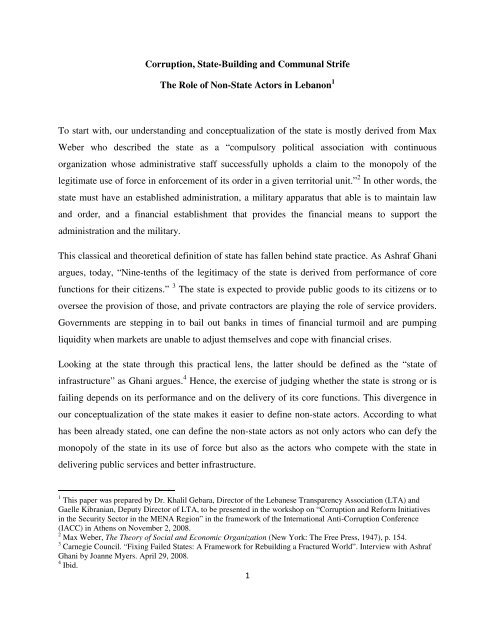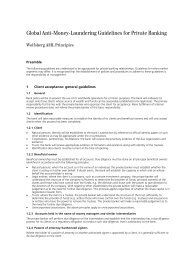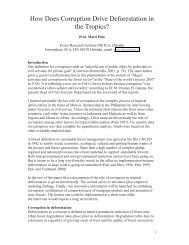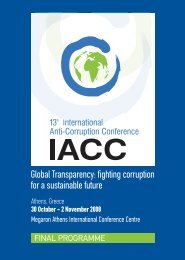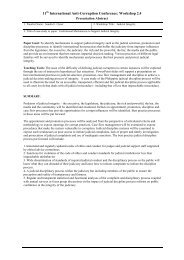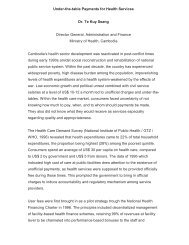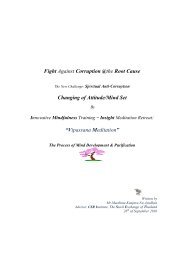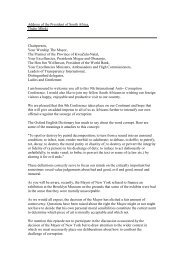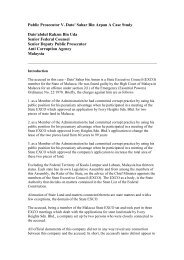The Role of Non-State Actors in Lebanon - International Anti ...
The Role of Non-State Actors in Lebanon - International Anti ...
The Role of Non-State Actors in Lebanon - International Anti ...
You also want an ePaper? Increase the reach of your titles
YUMPU automatically turns print PDFs into web optimized ePapers that Google loves.
Corruption, <strong>State</strong>-Build<strong>in</strong>g and Communal Strife<strong>The</strong> <strong>Role</strong> <strong>of</strong> <strong>Non</strong>-<strong>State</strong> <strong>Actors</strong> <strong>in</strong> <strong>Lebanon</strong> 1To start with, our understand<strong>in</strong>g and conceptualization <strong>of</strong> the state is mostly derived from MaxWeber who described the state as a “compulsory political association with cont<strong>in</strong>uousorganization whose adm<strong>in</strong>istrative staff successfully upholds a claim to the monopoly <strong>of</strong> thelegitimate use <strong>of</strong> force <strong>in</strong> enforcement <strong>of</strong> its order <strong>in</strong> a given territorial unit.” 2 In other words, thestate must have an established adm<strong>in</strong>istration, a military apparatus that able is to ma<strong>in</strong>ta<strong>in</strong> lawand order, and a f<strong>in</strong>ancial establishment that provides the f<strong>in</strong>ancial means to support theadm<strong>in</strong>istration and the military.This classical and theoretical def<strong>in</strong>ition <strong>of</strong> state has fallen beh<strong>in</strong>d state practice. As Ashraf Ghaniargues, today, “N<strong>in</strong>e-tenths <strong>of</strong> the legitimacy <strong>of</strong> the state is derived from performance <strong>of</strong> corefunctions for their citizens.” 3 <strong>The</strong> state is expected to provide public goods to its citizens or tooversee the provision <strong>of</strong> those, and private contractors are play<strong>in</strong>g the role <strong>of</strong> service providers.Governments are stepp<strong>in</strong>g <strong>in</strong> to bail out banks <strong>in</strong> times <strong>of</strong> f<strong>in</strong>ancial turmoil and are pump<strong>in</strong>gliquidity when markets are unable to adjust themselves and cope with f<strong>in</strong>ancial crises.Look<strong>in</strong>g at the state through this practical lens, the latter should be def<strong>in</strong>ed as the “state <strong>of</strong><strong>in</strong>frastructure” as Ghani argues. 4 Hence, the exercise <strong>of</strong> judg<strong>in</strong>g whether the state is strong or isfail<strong>in</strong>g depends on its performance and on the delivery <strong>of</strong> its core functions. This divergence <strong>in</strong>our conceptualization <strong>of</strong> the state makes it easier to def<strong>in</strong>e non-state actors. Accord<strong>in</strong>g to whathas been already stated, one can def<strong>in</strong>e the non-state actors as not only actors who can defy themonopoly <strong>of</strong> the state <strong>in</strong> its use <strong>of</strong> force but also as the actors who compete with the state <strong>in</strong>deliver<strong>in</strong>g public services and better <strong>in</strong>frastructure.1 This paper was prepared by Dr. Khalil Gebara, Director <strong>of</strong> the Lebanese Transparency Association (LTA) andGaelle Kibranian, Deputy Director <strong>of</strong> LTA, to be presented <strong>in</strong> the workshop on “Corruption and Reform Initiatives<strong>in</strong> the Security Sector <strong>in</strong> the MENA Region” <strong>in</strong> the framework <strong>of</strong> the <strong>International</strong> <strong>Anti</strong>-Corruption Conference(IACC) <strong>in</strong> Athens on November 2, 2008.2 Max Weber, <strong>The</strong> <strong>The</strong>ory <strong>of</strong> Social and Economic Organization (New York: <strong>The</strong> Free Press, 1947), p. 154.3 Carnegie Council. “Fix<strong>in</strong>g Failed <strong>State</strong>s: A Framework for Rebuild<strong>in</strong>g a Fractured World”. Interview with AshrafGhani by Joanne Myers. April 29, 2008.4 Ibid.1
This paper aims to look at the role <strong>of</strong> non-state actors <strong>in</strong> <strong>Lebanon</strong> while focus<strong>in</strong>g on their abilityto perform the functions <strong>of</strong> the state by either rely<strong>in</strong>g on outside resources or by abus<strong>in</strong>g the<strong>of</strong>ficial ones.<strong>Lebanon</strong>: A Failed <strong>State</strong>?<strong>The</strong> history <strong>of</strong> <strong>Lebanon</strong> is ma<strong>in</strong>ly a history <strong>of</strong> sectarian conflict and communal differentiation.<strong>Lebanon</strong> is a home to 3 religions, 18 sects and at least 2 ethnic m<strong>in</strong>orities. In the 19 th century,Mount-<strong>Lebanon</strong> was semi-autonomous region with<strong>in</strong> the Ottoman Empire. It was land-locked,but, at the same time, it was home to many religious m<strong>in</strong>orities, ma<strong>in</strong>ly the Druze, the Maronitesand the Shia. Beirut, as well as the other coastal towns with its Sunni majority, were under directOttoman rule. By the end <strong>of</strong> the 17 th century, Beirut became the capital <strong>of</strong> an Ottoman prov<strong>in</strong>ceand the headquarters <strong>of</strong> the Ottoman governor. This governor relied on a local bureaucracy andurban leadership composed ma<strong>in</strong>ly <strong>of</strong> Sunni notables, merchants, and religious figures. As notedearlier, Mount <strong>Lebanon</strong> was much more autonomous. Power was <strong>in</strong> the hands <strong>of</strong> a local Pr<strong>in</strong>cewho was semi-<strong>in</strong>dependent from the Ottomans but had to pay taxes to the Ottomans on regularbasis. Dur<strong>in</strong>g the 19 th century, and especially between 1825 and 1860, Mount <strong>Lebanon</strong> witnessedcivil strife. This civil strife was primarly about competition between Druze and Maronite feudalleaders over who will rule Mount <strong>Lebanon</strong>. It is worth not<strong>in</strong>g <strong>in</strong> this context, that unlike theurban population <strong>of</strong> Beirut, Mount <strong>Lebanon</strong> had a more hierarchical society where the majority<strong>of</strong> the population was peasants who were work<strong>in</strong>g for the notables and for the feudal leaders. <strong>The</strong>religious establishment at the same time was closely associated with the feudal and notablefamilies. Modernization and social mobilization were late-comers to Mount <strong>Lebanon</strong>. It camepredom<strong>in</strong>antly <strong>in</strong> the 19 th century with the expansion <strong>of</strong> foreign missionaries. <strong>The</strong> result <strong>of</strong> thecivil strife <strong>of</strong> the 19 th century was the <strong>in</strong>terference <strong>of</strong> great foreign powers <strong>of</strong> the time (namelythe French, Russians and British) who used this opportunity to weaken the Ottoman Empire orthe “sick man <strong>of</strong> Europe” as was commonly referred to. <strong>The</strong> arrangement that the great powerscame up with <strong>in</strong> coord<strong>in</strong>ation with the Maronite Church was a power-shar<strong>in</strong>g system based onconfessional distribution <strong>of</strong> seats <strong>in</strong> the local adm<strong>in</strong>istrative council <strong>of</strong> Mount <strong>Lebanon</strong>. 55 For more about civil strife <strong>in</strong> <strong>Lebanon</strong> and civil wars, see Samir Khalaf, Civil and Uncivil Violence <strong>in</strong> <strong>Lebanon</strong>(New Jersey: Pr<strong>in</strong>ceton University Press, 2003).2
This system survived until the end <strong>of</strong> World War I and the occupation <strong>of</strong> <strong>Lebanon</strong> by Frenchforces. <strong>The</strong> French decided to merge Mount <strong>Lebanon</strong> (with its delicate communal balance) withBeirut and other coastal towns <strong>in</strong> 1920, creat<strong>in</strong>g, Great <strong>Lebanon</strong> or simply <strong>Lebanon</strong>. This mergerdisturbed the communal balance, especially when Beirut and other coastal towns had a Sunnimajority. <strong>The</strong> most press<strong>in</strong>g challenges were to create a Lebanese identity and to conv<strong>in</strong>ce themajor communities <strong>in</strong> <strong>Lebanon</strong> that they could all benefit from the new arrangement.In 1926, Michel Chiha, a philosopher and banker by pr<strong>of</strong>ession, proposed a LebaneseConstitution <strong>in</strong>spired from the Constitution <strong>of</strong> the French Third Republic. Article 7 <strong>of</strong> theLebanese Constitution states “all Lebanese are equal before the law; they equally enjoy civil andpolitical rights and equally are bound by public obligations and duties without any dist<strong>in</strong>ction.”In relation to public <strong>of</strong>fice, Article 12 <strong>of</strong> the Constitution grants every citizen the right to holdpublic <strong>of</strong>fice without any preference be<strong>in</strong>g made except on the basis <strong>of</strong> merit and competence. Atthe same time, Michel Chiha argued that <strong>Lebanon</strong> will serve as a bridge between the East and theWest as well as a homeland for oppressed m<strong>in</strong>orities <strong>in</strong> the East.This constitution was sponsored by the French Mandate and was <strong>in</strong>tended to be the basis for asocial contract for an <strong>in</strong>dependent <strong>Lebanon</strong>. <strong>The</strong> major concerns for new political elite (whichwas a comb<strong>in</strong>ation <strong>of</strong> urban merchants and pr<strong>of</strong>essionals as well as Feudal leaders from themounta<strong>in</strong>s), was that the Sunni majority had not yet became conv<strong>in</strong>ced that it belonged to alimited foreign-def<strong>in</strong>ed geographic entity. For the urban Sunni majority, <strong>Lebanon</strong>, or at leastBeirut and the coastal towns, should belong to greater Syria. <strong>The</strong> other ma<strong>in</strong> concern was thatany modern political arrangement based on competitive elections and majoritarian system willdeny the right <strong>of</strong> m<strong>in</strong>orities to be represented, hence an alternative arrangement needed to befound.This alternative establishment was the creation <strong>of</strong> a parallel system based on power-shar<strong>in</strong>garrangement where all confessions would be represented. This power-shar<strong>in</strong>g system neededconsensus and elite cooperation. This system lasted until the eve <strong>of</strong> the civil war <strong>of</strong> 1975 and wasrestored with the Tai’f national accord <strong>of</strong> 1989 with a few modifications. As a result <strong>of</strong> thissystem, confessionalism or ensur<strong>in</strong>g confessional representation became an end by itself. It3
ecame the most important <strong>in</strong>stitution or pillar, responsible for ma<strong>in</strong>ta<strong>in</strong><strong>in</strong>g the stability <strong>of</strong> thecountry.One can argue that this parallel arrangement, or the National Pact, was <strong>in</strong>troduced to calm thefears <strong>of</strong> other m<strong>in</strong>orities. From the late 1920s until our present times, <strong>Lebanon</strong> has been ruled onnorms based on unconstitutional parallel arrangements where confessional leaders with thebless<strong>in</strong>g <strong>of</strong> their religious establishment imposed a cartel. As a result, <strong>Lebanon</strong> is ruled onconsensus, which has spread to all <strong>in</strong>stitutions. As stated by Chaaban and Gebara, “<strong>in</strong>confessional states, modern forms <strong>of</strong> associations which are based on either ideology or socioeconomicfactors are always overridden by primordial ties or forms <strong>of</strong> allegiances.” 6 In otherwords, whereas modern <strong>in</strong>stitutions were established to create a new form <strong>of</strong> identity andallegiance, <strong>in</strong> <strong>Lebanon</strong>, the primordial form <strong>of</strong> associations became a necessary condition tooccupy and ensure the proper function<strong>in</strong>g <strong>of</strong> these <strong>in</strong>stitutions.<strong>International</strong>ization <strong>of</strong> <strong>Lebanon</strong>So, hav<strong>in</strong>g this <strong>in</strong> m<strong>in</strong>d, and recall<strong>in</strong>g past clashes and Israeli <strong>in</strong>vasions, can we call <strong>Lebanon</strong> afailed state? In the 2007 “Failed <strong>State</strong>s Index”, the Fund for Peace and the Foreign PolicyMagaz<strong>in</strong>e ranked <strong>Lebanon</strong> 28 th country <strong>of</strong> the world to be a failed state, especially due to foreign<strong>in</strong>tervention and <strong>in</strong>creased group allegiance. 7 If we go back to Ashraf Ghani’s conception <strong>of</strong> astate, <strong>Lebanon</strong> has cearly failed <strong>in</strong> provid<strong>in</strong>g its citizens with the basic core functions as itshould. Fac<strong>in</strong>g confessional and communal forms <strong>of</strong> allegiance, the state has been, throughout itshistory, unable to provide the Lebanese neither with security, nor with public services. <strong>Lebanon</strong>has even failed to become a “state <strong>of</strong> <strong>in</strong>frastructure”. In the past few years, especially s<strong>in</strong>ce 2004,mount<strong>in</strong>g pressures to implement the UN Security Council’s Resolution 1559, a documentdrafted and pushed for by France and the US, <strong>in</strong>ternational <strong>in</strong>volvement <strong>in</strong> the country grew. <strong>The</strong>Resolution called for the withdrawal <strong>of</strong> Syrian presence from <strong>Lebanon</strong> and the disarmament <strong>of</strong>all Lebanese militias <strong>in</strong>clud<strong>in</strong>g Hezbollah. After the assass<strong>in</strong>ation <strong>of</strong> Prime M<strong>in</strong>ister Rafic Hariri<strong>in</strong> February 2005 and subsequent political assass<strong>in</strong>ations or attempts <strong>of</strong> assass<strong>in</strong>ation, <strong>Lebanon</strong>6 Jad Chaaban & Khalil Gebara, “Development <strong>in</strong> a Polarized Society: Look<strong>in</strong>g at Economic and SocialDevelopment <strong>in</strong> <strong>Lebanon</strong> Through a Different Lens,” Abaad, 2007, Number 11. P.5.7 “<strong>The</strong> Failed <strong>State</strong>s Index” by the Foreign Policy Magaz<strong>in</strong>e and Fund for Peace. July-August 2007.http://www.foreignpolicy.com/story/cms.php?story_id=38654
found itself <strong>in</strong> an even more pernicious situation <strong>in</strong> handl<strong>in</strong>g its <strong>in</strong>ternal security affairs than itwas dur<strong>in</strong>g the fifteen years <strong>of</strong> civil war. <strong>Lebanon</strong> entrusted the <strong>in</strong>ternational community with itsjudicial affairs. In July 2006, <strong>Lebanon</strong> witnessed aga<strong>in</strong> 34 days <strong>of</strong> war with major damages to its<strong>in</strong>frastructure, and subsequently to its already frail economy. Aga<strong>in</strong>, <strong>Lebanon</strong> turned to the<strong>in</strong>ternational community to ensure its <strong>in</strong>ternal security affairs, economic support as a follow-upto the already Paris II conference five years aid plan (2002-2007), and support <strong>in</strong> rebuild<strong>in</strong>g its<strong>in</strong>frastructure. Thus, <strong>Lebanon</strong>’s sovereignty has been breached <strong>in</strong> terms <strong>of</strong> the ma<strong>in</strong> functions <strong>of</strong>a state, leav<strong>in</strong>g the implementation <strong>of</strong> its security, judicial, economic, and <strong>in</strong>frastructure affairs <strong>in</strong>the hands <strong>of</strong> <strong>in</strong>ternational actors. But more importantly, it is <strong>Lebanon</strong>’s political affairs that havebeen <strong>in</strong>ternationalized, from the beg<strong>in</strong>n<strong>in</strong>g <strong>of</strong> the civil war to the latest communal clashes <strong>in</strong> May2008.<strong>International</strong>ization <strong>of</strong> <strong>Lebanon</strong>’s Judicial Affairs<strong>The</strong> assass<strong>in</strong>ation <strong>of</strong> Rafic Hariri set the jurisdiction <strong>of</strong> <strong>in</strong>vestigat<strong>in</strong>g on the case and prosecut<strong>in</strong>gthe people <strong>in</strong>volved <strong>in</strong> the February 14 assass<strong>in</strong>ation <strong>in</strong> the hands <strong>of</strong> an <strong>International</strong> Tribunal.This was a turn<strong>in</strong>g po<strong>in</strong>t <strong>in</strong> the <strong>in</strong>ternationalization <strong>of</strong> <strong>Lebanon</strong> as it demonstrated structural<strong>in</strong>ability <strong>of</strong> and lack <strong>of</strong> confidence <strong>in</strong> the Lebanese authorities to undertake its basic duties andbe<strong>in</strong>g able to <strong>in</strong>vestigate such a case. <strong>The</strong> Special Tribunal for <strong>Lebanon</strong> was set upon a requestfrom the Lebanese government by the end <strong>of</strong> 2005 through Resolution 1757 and entered <strong>in</strong>t<strong>of</strong>orce on June 10, 2007. <strong>The</strong> Tribunal was established under the motives <strong>of</strong> <strong>in</strong>ternational threatand was primarily sponsored by the United <strong>State</strong>s and France. <strong>The</strong> Tribunal will not only belook<strong>in</strong>g at the bomb<strong>in</strong>g connected to the assass<strong>in</strong>ation <strong>of</strong> Rafic Hariri but also go further <strong>in</strong>implement<strong>in</strong>g legal <strong>in</strong>vestigations on crimes that occurred after December 12, 2005.<strong>The</strong> Tribunal was established under Chapter 7 <strong>of</strong> the United Nations Charter, as the case isconsidered as an <strong>in</strong>ternational threat. Chapter 7 would allow military enforcement. <strong>The</strong>opponents to the resolution agreed that Chapter 7 would compromise even more Lebanesesovereignty as it “will create a precedent <strong>of</strong> the Security Council <strong>in</strong>terfer<strong>in</strong>g <strong>in</strong> the domestic5
affairs and legislative <strong>in</strong>dependence <strong>of</strong> the sovereign state”. 8Despite resentment, the<strong>International</strong> Tribunal for <strong>Lebanon</strong> is expected to be operational as <strong>of</strong> the end <strong>of</strong> 2008, and itwould def<strong>in</strong>itely be part <strong>of</strong> the <strong>in</strong>ternational community’s decision-mak<strong>in</strong>g process for <strong>Lebanon</strong>.<strong>International</strong>ization <strong>of</strong> <strong>Lebanon</strong>’s Security ApparatusTrust <strong>in</strong> the Lebanese security apparatus was badly impacted <strong>in</strong> <strong>Lebanon</strong> <strong>in</strong> the aftermath <strong>of</strong> theHariri assass<strong>in</strong>ation and follow<strong>in</strong>g the series <strong>of</strong> attacks. <strong>The</strong> situation deteriorated when <strong>Lebanon</strong>found itself fight<strong>in</strong>g a war aga<strong>in</strong>st Israel. In July 2006, with an army unprepared to handle thecrisis, Hezbollah lead the fight. <strong>The</strong> war was between Israel and Hezbollah. An end was put tothe conflict with Resolution 1701, passed unanimously by the UN Security Council. <strong>The</strong>Resolution reaffirms the role <strong>of</strong> the already exist<strong>in</strong>g United Nations Interim Forces <strong>in</strong> <strong>Lebanon</strong>(UNIFIL), to commit to peace at the Lebanese-Israeli borders, by <strong>in</strong>creas<strong>in</strong>g the number <strong>of</strong>troops to 15,000. <strong>The</strong> Resolution calls on <strong>Lebanon</strong> to disarm all <strong>of</strong> the non-Governmental armedforces. More importantly, Resolution 1701 enhances the role <strong>of</strong> the Lebanese Army, by giv<strong>in</strong>g itthe authority to make use <strong>of</strong> “all necessary actions” to restore peace <strong>in</strong> the country. 9Still dependent on the <strong>in</strong>ternational community for its own security two years after the entry <strong>in</strong>t<strong>of</strong>orce <strong>of</strong> Resolution 1701, the Lebanese Army seems <strong>in</strong>capable <strong>of</strong> implement<strong>in</strong>g the resolution.<strong>The</strong> latter does not have the capacity to disarm Hezbollah, whose militia has proven too strong.<strong>International</strong>ization <strong>of</strong> the Lebanese EconomyAt the eve <strong>of</strong> the July 2006 war, <strong>Lebanon</strong> had one <strong>of</strong> the largest debt ratios <strong>of</strong> the world, withpublic debt amount<strong>in</strong>g to almost 40 billion dollars, or 180% <strong>of</strong> the country’s GDP. <strong>Lebanon</strong> was<strong>in</strong>cluded as <strong>of</strong> the end <strong>of</strong> the civil war <strong>in</strong> the aid plan <strong>of</strong> the <strong>in</strong>ternational community. <strong>The</strong> latestaid <strong>in</strong>itiative was the Paris II conference which granted the country 4.2 billion dollars <strong>in</strong> aid overa five-year period extend<strong>in</strong>g from 2002 to 2007. Before achiev<strong>in</strong>g the end <strong>of</strong> the Paris II’smandate, <strong>Lebanon</strong> aga<strong>in</strong> witnessed a war with devastat<strong>in</strong>g effects, further weaken<strong>in</strong>g itseconomy. Another donors’ conference was held <strong>in</strong> Paris to support <strong>Lebanon</strong>, known as the ParisIII <strong>International</strong> Conference for Support to <strong>Lebanon</strong>, dur<strong>in</strong>g which the Lebanese Government8 Wang Guangya, Ch<strong>in</strong>a’s UN Ambassador, cited <strong>in</strong>: Farley, Maggie. “U.N. to establish <strong>Lebanon</strong> Tribunal”. LosAngeles Times. May 31, 2007.9 United Nations. “Resolution 1701 (2006). UN Security Council. August 11, 2006.6
clearly requested foreign <strong>in</strong>terference <strong>in</strong> its economic affairs. As stated <strong>in</strong> the preface <strong>of</strong> thereport presented by <strong>Lebanon</strong> on January 25, 2007 <strong>in</strong> Paris on Recovery, Reconstruction, andReform, “<strong>Lebanon</strong> cannot shoulder this price on its own. […] <strong>Lebanon</strong> is therefore hopeful thaton the occasion <strong>of</strong> the ‘<strong>International</strong> Conference for Support to <strong>Lebanon</strong>’, the <strong>in</strong>ternationalcommunity will <strong>in</strong>vest <strong>in</strong> <strong>Lebanon</strong>’s future and democracy”. 10 <strong>The</strong> Lebanese government wasable to pledge 7.6 billion dollars subject to the conditionality <strong>of</strong> major political and socioeconomicreforms, as well as management <strong>of</strong> its public debt.<strong>International</strong>ization <strong>of</strong> <strong>Lebanon</strong>’s Infrastructure<strong>The</strong> 34-day July war between Israel and Hezbollah was one <strong>of</strong> the most destructive wars facedby <strong>Lebanon</strong>, with a death toll <strong>of</strong> 1,200, 160,000 hous<strong>in</strong>g units, roads, and bridges totally orpartially destroyed, and jobs lost and bus<strong>in</strong>esses damaged. <strong>The</strong> losses were estimated to represent30% <strong>of</strong> <strong>Lebanon</strong>’s GDP. 11 Aga<strong>in</strong>, the Lebanese government turned to the <strong>in</strong>ternationalcommunity for the reconstruction <strong>of</strong> the damaged <strong>in</strong>frastructure.A conference held <strong>in</strong> Stockholm at the end <strong>of</strong> August 2006, and attended by more than 60governments’ and <strong>in</strong>ternational organizations’ representatives resulted <strong>in</strong> 940 million USD <strong>in</strong>pledges for <strong>Lebanon</strong>. <strong>The</strong> commitments at Stockholm were re<strong>in</strong>forced by the Paris III conference<strong>in</strong> January 2007. <strong>The</strong> most notable donors <strong>in</strong> this conference were Middle Eastern countries, withthe K<strong>in</strong>gdom <strong>of</strong> Saudi Arabia pledg<strong>in</strong>g 500,000 USD, Europe, Australia, Canada, Japan, and theUnited <strong>State</strong>s pledg<strong>in</strong>g 230,000 USD to help rebuild <strong>Lebanon</strong>. Countries such as Qatar directlyadopted projects <strong>in</strong> <strong>Lebanon</strong> <strong>in</strong> a format <strong>of</strong> a sponsorship process. Qatari funds targeted thereconstruction <strong>of</strong> bridges, schools, places <strong>of</strong> worship, and households <strong>in</strong> four Southern Lebanesevillages. 1210 Lebanese Republic. “Recovery, Reconstruction, and Reform”. Report presented at the <strong>International</strong> Conferencefor Support to <strong>Lebanon</strong> <strong>in</strong> Paris on January 25, 2007. Beirut: <strong>Lebanon</strong>. January 02, 2007.11 Salem, Paul. “<strong>Lebanon</strong>: Build<strong>in</strong>g on Resolution 1701”. Address to the U.S. Senate Foreign Relations Committee.September 13, 2006.12 See the Lebanese Transparency Association unpublished report: “Post-War Reconstruction” Report on theReconstruction <strong>of</strong> Bridges and Hous<strong>in</strong>g Compensation <strong>in</strong> the aftermath <strong>of</strong> the July 2006 War (expected publicationdate December 2008).7
<strong>International</strong>ization <strong>of</strong> <strong>Lebanon</strong>’s Political Affairs<strong>The</strong> <strong>in</strong>ternationalization <strong>of</strong> <strong>Lebanon</strong>’s state functions has added to the regionalization and<strong>in</strong>ternationalization <strong>of</strong> the Lebanese peace process. <strong>International</strong> and regional actors are hav<strong>in</strong>g adirect impact on the country’s political affairs. <strong>The</strong> beg<strong>in</strong>n<strong>in</strong>g <strong>of</strong> the civil war was marked byregional diplomatic <strong>in</strong>volvement, especially from Syria and Saudi Arabia. Saudi Arabia brokeredthe Riyad Conference, which focused on the Constitutional process <strong>in</strong> <strong>Lebanon</strong> <strong>in</strong> October 1976;the meet<strong>in</strong>g was attended by Syria as well. European countries later <strong>in</strong>terfered <strong>in</strong> the Lebanesepeace process. In 1984 the Geneva and Lausanne conferences aimed at br<strong>in</strong>g<strong>in</strong>g about politicalreconciliation <strong>in</strong> <strong>Lebanon</strong>. This was followed by a peace effort sponsored by Syria, better knownas the Tri-partite agreement <strong>of</strong> December 1985, aim<strong>in</strong>g at an <strong>in</strong>ternal political settlement <strong>in</strong><strong>Lebanon</strong>. <strong>The</strong> <strong>in</strong>ternational, and more importantly, regional peace efforts towards <strong>Lebanon</strong>,which marked the <strong>in</strong>ternationalization <strong>of</strong> its political affairs, culm<strong>in</strong>ated <strong>in</strong> October 1989 with theTaif Accords, under Syrian and Saudi tutelage. Taef was set up to return the Lebanese <strong>State</strong> itssovereignty and control over its land and army. Taef actually led to more important securityissues <strong>in</strong> the country with extended Syrian presence. <strong>The</strong> Taef restored a statu quo to an nonsovereignbut stable <strong>Lebanon</strong>, until the assass<strong>in</strong>ation <strong>of</strong> Prime M<strong>in</strong>ister Hariri and a subsequentpolitical crisis. <strong>The</strong> eighteen-month crisis culm<strong>in</strong>ated with <strong>in</strong>ternal communal violence and strifeamong supporters <strong>of</strong> the government on the one hand and the opposition on the other, with theLebanese Army unable to handle the situation. This time it was a Qatari <strong>in</strong>tervention thatrestored peace to <strong>Lebanon</strong>. Lebanese and regional political leaders agreed on the DohaAgreement <strong>in</strong> order to end the political crisis and avoid the burst <strong>of</strong> another civil war.Rise <strong>of</strong> <strong>Non</strong>-<strong>State</strong> <strong>Actors</strong><strong>The</strong> <strong>in</strong>ternationalization <strong>of</strong> <strong>Lebanon</strong> demonstrates that neither the national <strong>in</strong>stitutions nor thepolitical process are equipped to fix <strong>in</strong>ternal problems. This resulted <strong>in</strong> the freez<strong>in</strong>g or collapse <strong>of</strong><strong>in</strong>stitutions with every political disagreement.In theory, constitutional <strong>in</strong>stitutions are supposed to conta<strong>in</strong> and handle disputes among differentactors. In <strong>Lebanon</strong>, these <strong>in</strong>stitutions are unable to protect the political process. <strong>The</strong>n, politicians8
<strong>in</strong>volved <strong>in</strong> the state or the state actors will be encouraged to rely on other means to protect their<strong>in</strong>terests. This argument can be illustrated with two key <strong>in</strong>dicators <strong>in</strong> <strong>Lebanon</strong>; one <strong>of</strong> a politicalnature and the other <strong>of</strong> a socio-economic perspective.In <strong>Lebanon</strong>, politicians would mobilize resources and build militias that would be activated <strong>in</strong>times <strong>of</strong> communal strife and put on hold <strong>in</strong> times <strong>of</strong> stability. <strong>The</strong> dramatic events <strong>in</strong> Beirut <strong>in</strong>May 2008 were a turn<strong>in</strong>g po<strong>in</strong>t <strong>in</strong> <strong>Lebanon</strong>’s security sector, as they showed that otherundiscovered militias or militant groups were develop<strong>in</strong>g. A Hezbollah-led attack took place onWest Beirut, but soon, a group that operated as a private security firm appeared to counter theShiite group. 13 <strong>The</strong> group is aligned with the Sunni Future Movement headed by Saad Hariri,who has disbursed millions <strong>of</strong> dollars and built a militia to “create a balance <strong>of</strong> terror”, protectthe Sunnis’ <strong>in</strong>terests, and face the Party <strong>of</strong> God. 14 It is noteworthy to mention that the rise <strong>of</strong> themilitia there is a direct l<strong>in</strong>k to a regional Sunni axis, which encompasses Egypt, Saudi Arabia,and Jordan.On the other hand, the failure <strong>of</strong> <strong>in</strong>stitutions has created the opportunity for non-political actorsto rise, and fill-<strong>in</strong> a socio-economic vacuum. In the days if not the hours follow<strong>in</strong>g the cease fireon August 14, 2006, Hezbollah responded to the needs <strong>of</strong> Lebanese victims <strong>of</strong> the war, deriv<strong>in</strong>gits funds from Syria and Iran. Jihad Al B<strong>in</strong>a, the construction arm <strong>of</strong> Hezbollah, was directly onthe ground work<strong>in</strong>g towards rehabilitat<strong>in</strong>g the devastated areas. Hezbollah provided f<strong>in</strong>ancialcompensations to the July war victims to pay for new furniture and rent. <strong>The</strong> LebaneseGovernment was much less effective <strong>in</strong> its response, and unable to directly support the citizenswith f<strong>in</strong>ancial aid. An article review<strong>in</strong>g the aid process <strong>in</strong> <strong>Lebanon</strong> quotes an <strong>in</strong>habitant <strong>of</strong> South<strong>Lebanon</strong> who said: “I feel Hezbollah is the government. <strong>The</strong>y protect us”. 15 Here aga<strong>in</strong>, it isclear that the political process <strong>in</strong> <strong>Lebanon</strong> does not solve socio-economic problems.With no control over its security apparatus, and ris<strong>in</strong>g militias allied with foreign powers, similarto the aftermath <strong>of</strong> the civil war, a complete breakdown <strong>of</strong> ethical and moral values waswitnessed. This situation led to an enhancement <strong>of</strong> the already well-established corrupt practices,13 Daragahi, Borzou and Rafei, Raed. “<strong>Lebanon</strong>’s Sunni bloc built militia, <strong>of</strong>ficial say”. Los Angeles Times. May 12,2008.14 Ibid.15 Thanassis Cambanis cited <strong>in</strong> Chaaban and Gebara. Page 8.9
which will be reflected <strong>in</strong> the country’s political, social, and economic arenas. This is the directresult <strong>of</strong> the Lebanese 1943 National Pact and the Taef Accord that led to a rise <strong>of</strong> politicalelites: “Hence stability <strong>in</strong> this confessional and power-shar<strong>in</strong>g system is positively correlatedwith consensus and cooperation”. 16 To understand the range and impact <strong>of</strong> corruption <strong>in</strong> postwareras, Elizabeth Picard’s analysis on the behavior <strong>of</strong> warlords can be <strong>of</strong> great help. Whenstates face military coercion and a re-organization <strong>of</strong> allegiances, the <strong>in</strong>stitutionalization <strong>of</strong>corruption is triggered by the creation <strong>of</strong> “m<strong>in</strong>i-states” <strong>in</strong> specific areas <strong>of</strong> <strong>in</strong>fluence. 17 <strong>The</strong>militialization <strong>of</strong> <strong>Lebanon</strong> has always led to “a process <strong>of</strong> state build<strong>in</strong>g <strong>in</strong>side their [the militias]cantons when they established their own public sectors and courts”. 18 Militias thus f<strong>in</strong>dthemselves fac<strong>in</strong>g a failed state, where they can freely operate and create areas <strong>of</strong> control, wheremalpractices such as <strong>in</strong>timidation, lack <strong>of</strong> accountability, favoritism, patronage, clientalism arecommon. <strong>The</strong> different poles <strong>of</strong> <strong>Lebanon</strong> are turn<strong>in</strong>g to <strong>in</strong>ternational actors for material andtechnical support. Now, and especially after the events <strong>of</strong> May 2008, corruption seems to be acompetition for resources among the different emerg<strong>in</strong>g militias to keep the network <strong>of</strong> non-stateactors roll<strong>in</strong>g.Recent surveys on corruption, such as the 2008 Corruption Perceptions Index (CPI 2008)released by Transparency <strong>International</strong> ranks <strong>Lebanon</strong> 102 nd among 180 states (11 th regionally)and attributes it a score <strong>of</strong> 3.0/10 and puts <strong>Lebanon</strong> <strong>in</strong> a position “between decl<strong>in</strong>e andstead<strong>in</strong>ess”. 19 <strong>The</strong> entrapment <strong>of</strong> <strong>Lebanon</strong>, and the fact that the country did not progress on theCPI year after year, is correlated to the deadlock and political crisis the country is fac<strong>in</strong>g s<strong>in</strong>ce2005. Only an activation <strong>of</strong> <strong>in</strong>stitutions and reforms among them can help the country toovercome the stalemate. This is aga<strong>in</strong> proven <strong>in</strong> the results <strong>of</strong> the Global Integrity Report for2007 that characterizes <strong>Lebanon</strong> as a “very weak” state <strong>in</strong> terms <strong>of</strong> <strong>in</strong>tegrity among the measured<strong>in</strong>stitutions and assigns an overall score <strong>of</strong> 45/100. 20 L<strong>in</strong>k<strong>in</strong>g both <strong>in</strong>dexes to each other leads us16 Michael Hudson cited <strong>in</strong> Gebara, Khalil. “<strong>The</strong> Lebanese Entrapment”, Democracy and Society. <strong>The</strong> Center forDemocracy and Civil Society: Georgetown University. Volume 4, Issue 2. Spr<strong>in</strong>g 2007.17 Elizabeth Picard cited <strong>in</strong> Gebara, Khalil. “Reconstruction Survey: <strong>The</strong> Political Economy <strong>of</strong> Corruption <strong>in</strong> Post-War <strong>Lebanon</strong>”. Tiri: London. 2007. Page 9.18 Fawaz Traboulsi cited <strong>in</strong> Gebara, Khalil. Reconstruction Survey: <strong>The</strong> Political Economy <strong>of</strong> Corruption <strong>in</strong> Post-War <strong>Lebanon</strong>”. Tiri: London. 2007. Page 9.19 <strong>The</strong> Lebanese Transparency Association. “Corruption Perceptions Index: <strong>Lebanon</strong> Caught between Decl<strong>in</strong>e andStead<strong>in</strong>ess”. LTA: Beirut. Press Release- September 23, 2008.20 Global Integrity. “<strong>Lebanon</strong>: Global Integrity Report 2007”. http://report.global<strong>in</strong>tegrity.org/<strong>Lebanon</strong>/200710
to conclude that corruption, <strong>in</strong> its <strong>in</strong>teraction with the state, becomes part <strong>of</strong> the system itself.Aditionally, it is the fuell<strong>in</strong>g <strong>of</strong> the system with corruption that keeps the system roll<strong>in</strong>g. <strong>The</strong>system itself ensures a clientalistic network <strong>of</strong> communities ready to be used <strong>in</strong> times <strong>of</strong>communal quarrels.Conclusion: Time for Reforms<strong>The</strong> <strong>in</strong>ternalization <strong>of</strong> <strong>Lebanon</strong> was a result <strong>of</strong> heated and non-consensual <strong>in</strong>ternal debate overthe role <strong>of</strong> the <strong>in</strong>ternational community lead<strong>in</strong>g to a threat to the country’s stability. <strong>International</strong>actors are becom<strong>in</strong>g dangerously <strong>in</strong>volved <strong>in</strong> the country’s political process and take part <strong>in</strong> thecountry’s polarization. As a result <strong>of</strong> the <strong>in</strong>ternationalization process, each side <strong>of</strong> the politicalspectrum is f<strong>in</strong>d<strong>in</strong>g its own sponsors. Specifically, vital issues as mentioned above such assecurity, justice, <strong>in</strong>frastructure, and economy are <strong>in</strong> the hands <strong>of</strong> the polarized <strong>in</strong>ternationalcommunity, render<strong>in</strong>g these issues separate from a natural and healthy system <strong>of</strong> checks andbalances. <strong>The</strong> Lebanese government itself is <strong>in</strong>capable <strong>of</strong> controll<strong>in</strong>g the <strong>in</strong>ternational actors,result<strong>in</strong>g <strong>in</strong> a generally tensed climate. With a fail<strong>in</strong>g system <strong>of</strong> checks and balances, <strong>Lebanon</strong>’s<strong>in</strong>tegrity is even compromised and corruption very difficult to curb.<strong>The</strong> failure <strong>of</strong> the Lebanese <strong>State</strong> lies ma<strong>in</strong>ly <strong>in</strong> the fact that each party believes that <strong>in</strong>ternationalactors are promot<strong>in</strong>g external <strong>in</strong>terests <strong>in</strong> <strong>Lebanon</strong>. <strong>The</strong> issue is thus much more <strong>in</strong>ternal thanexternal. <strong>Lebanon</strong> lacks <strong>of</strong> impartial judiciary, economic, and reconstruction policies. Moreimportantly, <strong>Lebanon</strong> failed <strong>in</strong> creat<strong>in</strong>g a unified security strategy; it encouraged the activation <strong>of</strong>militias. <strong>The</strong>refore, given the position<strong>in</strong>g <strong>of</strong> each Lebanese bloc and the polarization <strong>of</strong><strong>Lebanon</strong>’s <strong>in</strong>ternationalization, it was a voluntary decision for political actors and decisionmakersto become non-state actors. <strong>Lebanon</strong> is aga<strong>in</strong> witness<strong>in</strong>g the rise <strong>of</strong> militias, as it hasalways has dur<strong>in</strong>g times <strong>of</strong> political crisis and collapse <strong>of</strong> the state.<strong>The</strong> challenges the Lebanese <strong>State</strong> is fac<strong>in</strong>g today h<strong>in</strong>der the implementation <strong>of</strong> its full-scalesovereignty. As we have seen, <strong>Lebanon</strong>’s history <strong>of</strong> communal and confessional strife has led <strong>in</strong>several <strong>in</strong>stances to the breakdown <strong>of</strong> the country. For many years now, <strong>Lebanon</strong> has onlyenjoyed limited sovereignty due to external <strong>in</strong>terference. After the assass<strong>in</strong>ation <strong>of</strong> Prime11
M<strong>in</strong>ister Hariri, <strong>Lebanon</strong> has, more than ever, been <strong>in</strong> danger <strong>of</strong> becom<strong>in</strong>g a “failed state” <strong>in</strong> thedef<strong>in</strong>ition <strong>of</strong> its security apparatus.In order to avoid security setbacks and avoid the mistakes <strong>of</strong> the past, <strong>Lebanon</strong> has to go througha series <strong>of</strong> serious reform <strong>in</strong>itiatives. Political reform needs to be built on dialogue with<strong>in</strong> theparliament and political elites. But reform cannot take place without a reform strategy that<strong>in</strong>volves citizens <strong>in</strong> the decision-mak<strong>in</strong>g process. <strong>Lebanon</strong> should also <strong>in</strong> the com<strong>in</strong>g months bevery cautious while adapt<strong>in</strong>g the electoral reforms as advanced by the new Electoral Law so as toguarantee free, fair, and representative elections. F<strong>in</strong>ally, <strong>Lebanon</strong>’s laws and <strong>in</strong>stitutions shouldalso be subjected to reforms, <strong>in</strong> a way to promote more transparency and accountability. Legalreforms on the current budgetary and illicit wealth laws should take place. <strong>Lebanon</strong> should alsoadopt new legislation regard<strong>in</strong>g the fight aga<strong>in</strong>st corruption, <strong>in</strong>clud<strong>in</strong>g an Access to Informationlaw and a Whistleblowers’ Protection Law. 21 Decision makers should push and ensure theimplementation <strong>of</strong> the United Nations Convention aga<strong>in</strong>st Corruption (UNCAC), ratified at thebeg<strong>in</strong>n<strong>in</strong>g <strong>of</strong> October 2008.21 See, Khalil Gebara, Annahar, September 2008.12


